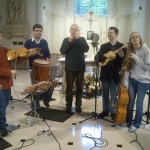Music
Follow the James Shirley Project
Music
Shadows, Not Substantial Things – Music in the Works of James Shirley (1596-1666)
Director: Andrew Ashbee
With the support of the Arts Council England
Shadows, Not Substantial Things showcases the glorious music performed in indoor Jacobean and Caroline theatres in the era following Shakespeare.
None of the music has been recorded previously, making this a unique and valuable archive of historical interest. The period is still little-known compared with the earlier Shakespearian and later Restoration eras, and this CD breaks new ground offering the first chance to hear recorded performances of extant pieces from Shirley’s work.
Shadows, Not Substantial Things has been called the musical equivalent of the Globe Theatre’s Sam Wanamaker Playhouse; it’s the closest thing to time travel.
The CD features music for James Shirley’s poems, plays, and entertainments. Recordings took place on 20-22 October 2014 at St John’s Wood Church, London. The CD will be produced by Ambisound Recording Service and will be forthcoming in early 2015. Content:1. Edward Coleman: The Glories of Our Birth and State (from The Contention of Ajax and Ulysses)
2a. John Hilton: Turn Amarillis to Thy Swain (from The School of Compliment)
2b. Thomas Brewer: Turn Amarillis to Thy Swain
3. Cittern arrangements
4. William Lawes: Come my Daphne, Come Away (from The Cardinal)
5. Ballad: With a Fading (from The Bird in a Cage)
6a. Henry Lawes: Would You Know What’s Soft? (from Poems)
6b. Anon.: Would You Know What’s Soft?
6c. Robert Johnson: Have You Seen but a White Lily Grow? (from The Variety)
7. Lyra viol arrangements
8. William Lawes: What Should My Mistress Do with Hair? (from Poems)9. John Hilton: There Was an Invisible Fox (from The Bird in a Cage)
Music from THE TRIUMPH OF PEACE
10a. Davis Mell: Moresca
10b. Davis Mell: Courante
11. William Lawes: Song I
12. William Lawes: Song II
13. William Lawes: Song III
14. Simon Ives: Symphony, Song IV
15. Simon Ives: Symphony: Song V
16. Simon Ives: Symphony: Song VI
17. William Lawes: Song VII
18. William Lawes: Song VIII
19. William Lawes: conclusion of Song IX and Symphony (VdGS no. 453)
20. William Lawes: Come Let Us Cast the Dice (from Poems)
21. William Lawes: Good Morrow unto Her (from Poems)
22. William Lawes: Hark, Hark how in Ev’ry Grove (from Poems)
23. Ballad: Turn again Whittington (from The Constant Maid)
24. William Lawes: I Would the God of Love Would Die (from Poems)
25. Bagpipe arrangements
26. William Lawes: Cease Warring Thoughts (from The Triumph of Beauty)
27. William Lawes: O Think not Phoebe (from Poems)
28. Anon.: Cupid Calls (from Poems)
29. Ballad: When Cannons are Roaring (from The School of Compliment)
Music from CUPID AND DEATH
30. Anon.: Apes’ Dance
31. Christopher Gibbons: Open Blest Elizium Grove

Passamezzo
Emily Atkinson – soprano
Richard Mackenzie – lute, theorbo, guitar, bass
Alison Kinder – bass viol, recorder
Keith McGowan – flute, recorders, curtal, bagpipes, Jew’s harp, harp
Tamsin Lewis – Renaissance violin, alto, drum
Richard de Winter – tenor, drum
David de Winter – tenor
Peter Willcock – bass, recorder
Richard MacKenzie interviews Tamsin Lewis on the music of James Shirley and Passamezzo’s new CD. Broadcast on Radio Resonance 104.4 fm, 3 Feb 2014, 11am.
Featuring the ‘Invisible Fox’ from The Bird in a Cage, ‘Would You Know What’s Soft’, ‘What Would My Mistress Do with Hair’, songs and instrumental music from The Triumph of Peace and Cupid and Death, and a moresca by the violinist Davis Mell. Follow this link to the radio interview
Leave a Reply
Your email address will not be published. Required fields are marked *
